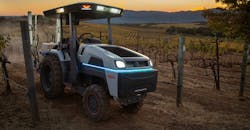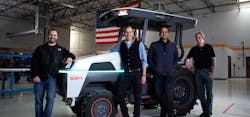Farming is a tough business rife with challenges.
- Labor shortages continue to grow in what could rightfully be called an exodus of manpower. In some countries, the average age for farmers is in the mid-60s.
- The use of chemicals and commodity farming (often used as a means to maximize crop output) are rapidly falling out of favor as consumers thirst for organics, sustainability and regenerative practices.
- Governmental regulations and compliance requirements add complexity.
Simply put, farmers are getting squeezed, and farming is already a low margin business.
“It does not have to be this way,” says Praveen Penmetsa, CEO of Livermore, Calif.-based Monarch Tractor. Monarch envisions farming as an economically profitable career. “We want to prioritize farmer community health, and also sustainable farming practices. We see a future where farming has the latest and greatest technology so that it can start to attract the best minds,” he says.
Planting seeds
Monarch's mission is to enable clean farming, and it starts with delivering a smart tractor that the average farmer can afford.
With broad experience in the automotive and aerospace world, Penmetsa was surprised by the huge technology gap existing in today’s compact tractor segment as well as the emissions (a tractor puts out roughly 14 plus cars worth of emissions). "If you look at where technology is in your car today, or the rest of your life and then look at the typical tractor, the gap is huge," he says. “At a time when we need to increase food production around the world to support our growing population, the technology gap creates an opportunity. That's why Monarch is focused on transforming the tractor and bringing it up to the current state of tech to serve as a more meaningful tool for the future.”
Utilizing a standard car charging port, the Monarch tractor is all electric, has driver optional capabilities, a comprehensive data layer and it can interface with both existing farm technologies while sporting flexibility to enable future technologies.
The Monarch tractor is a 40 HP (70 HP peak) machine designed to provide much needed functionality for all farmers – not just large commodity operations.
“It is a game changer capable of providing twice the amount of torque of our competing diesel tractors. When coupled with the driver-optional features and the data hub it can assist farming operations in a sustainable manner.”
The Monarch tractor has several ways to incorporate on-farm autonomy operations. It utilizes the latest autonomous hardware and software technology to provide driver-assist and driver-optional operations. The tractor can perform pre-programmed tasks without a driver or an operator can use interactive automation features including Gesture and Shadow modes to have the tractor follow a worker on the job. It also has safety features such as such as 360 degree video detection, where, if an implement is working and somebody walks up to it, it can immediately stop the implement.
The Monarch also provides field mapping to operate within specified fields, explains Penmetsa. “Farmers can create mission plans for the tractor to follow from the dashboard. However, the Monarch tractor is a no-compromise tractor. While it has an incredible amount of technology that doesn't mean it needs to be harder to operate. We designed it with a farmer first mentality, so it can be driven just like a regular tractor, but also has an onboard service and operations manual so the farmer’s team can easily operate, train and maintain the tractor.”
Making the most of its deep learning capabilities, the tractor collects and analyzes over 240GB of crop data daily as it operates in the field. Sensors and imaging are processed to provide critical data points that can be used for real-time implement adjustments as well as long term yield estimates, current growth stages and other crop health metrics. Utilizing machine learning, Monarch accurately provides long-term analysis of field health – analysis that continues to improve over time.
The Monarch also acts as a generator. "Imagine a generator that comes to you in the middle of the field because of a combination of our automation features and the tractors capability," he says. "It also has storage capabilities allowing you to move things around as needed."
Penmesa tells IndustryWeek, Monarch is on track for its first commercial deliveries in the second half of 2021. And, with a goal of making the farmer's life a lot easier, Monarch already has an array of new features queued up in its roadmap. As such, the development team continues to work on exciting new features to further cement the Monarch as a very connected, smart tractor. “What that means is, while the tractor is built for decades of use from a hardware perspective, on the software side farmers will see continuous evolution.”
What makes it even more exciting is that this segment is growing globally as the most commonly used tool, explains Penmesa. "You see this size tractor at airports, on the sides of highways or city parks mowing the grass. The versatility makes them suitable for an array of operations, and Monarch adds a layer of sustainability and safety."
Surprisingly, the biggest obstacle is convincing farmers to trust technology. "Historically, technology has been used to create a roadblock for farmers, whether the technology is not robust enough and fails out in the field, or manufacturers use technology to extract more money out of the farmer without providing value," he says. "When you do that in a razor thin margin business like farming, the benefits quickly dissipate.”
Penmesa hopes to change that mindset by being very open. “We don't look at things like maintenance and service as revenue generators for the business. We want to enable the farmers to be able to customize and repair their equipment using their own capabilities,” he says.
Bottom line: "We should all care about our food ecosystems and the farming communities. If there's anything that COVID has taught us, it's that food security is crucial. We need to be able to provide food security for the world's growing population in a long-term sustainable way that is good for the soil, good for the consumer, and profitable for the farmer. We have to find that balance – and recognize that farming touches all of us."
- Praveen Penmetsa, chief executive officer and co-founder. Praveen has significant experience in the automotive and aerospace world bringing innovative products to market. His previous company was a product innovation farm, with clients such as Airbus, Volvo, Honda and Toyota. So bringing that kind of a product development and innovation experience into farming.
- Mark Schwager, president and co-founder. Schwager was at Tesla from 2010 to 2015 with production responsibility for models ranging from the Roadster to the Model S. He was instrumental in scaling the propulsion side of the Model S factory. He brings the level of manufacturing experience needed to scale the technology Monarch is building for farmers.
- Dr. Zachary Omohundro, chief technology officer and co-founder. Omohundro comes from the Carnegie Mellon robotics lab, and he's worked on electric and autonomous cars, electric planes and has been working on agriculture robotics for the last five years.
- Carlo Mondavi, chief farming officer and co-founder. From the well-known Mondavi wine family, he is a thought leader on regenerative farming and sustainable farming practices.
- Chris Whitney, head of automation. Whitney was a lead at Hewlett Packard's Asia Pacific R&D department. He was also responsible for an autonomous security robot company as a CTO afterward. At Monarch he will drive the automation and data side of the business.
About the Author
Peter Fretty
Technology Editor
As a highly experienced journalist, Peter Fretty regularly covers advances in manufacturing, information technology, and software. He has written thousands of feature articles, cover stories, and white papers for an assortment of trade journals, business publications, and consumer magazines.


